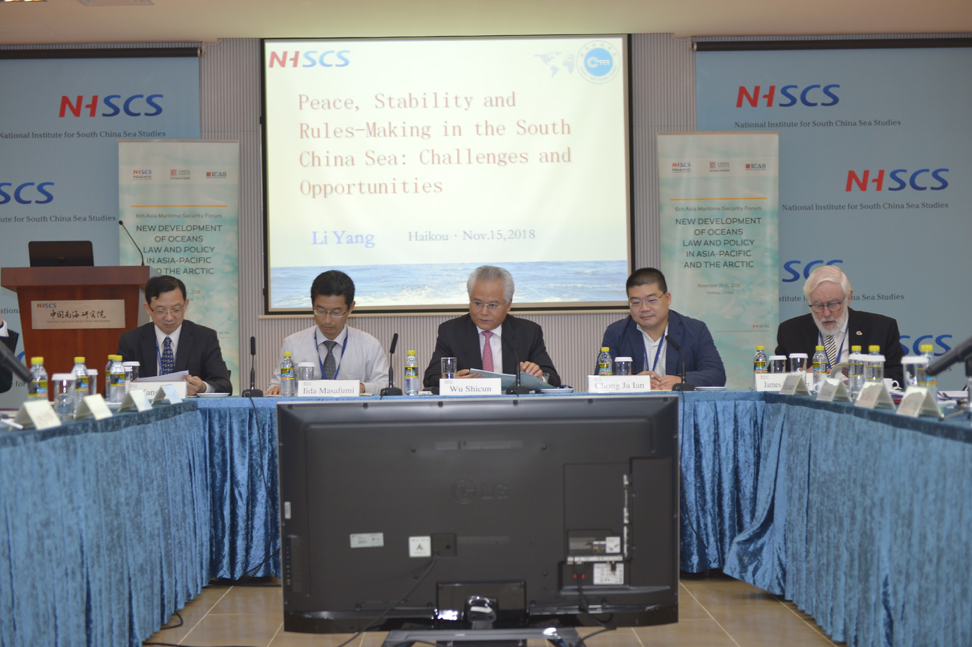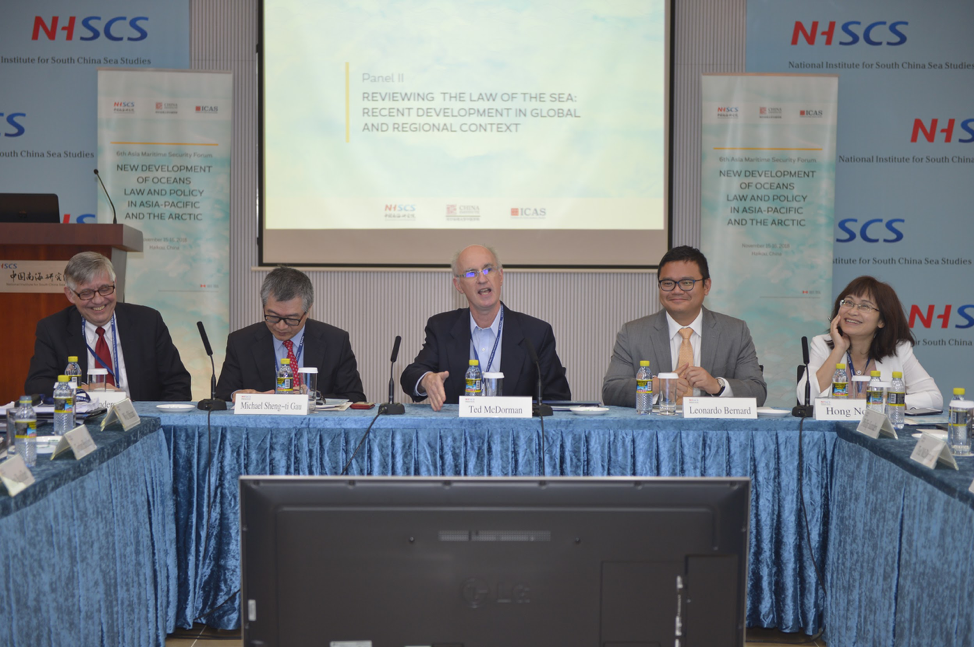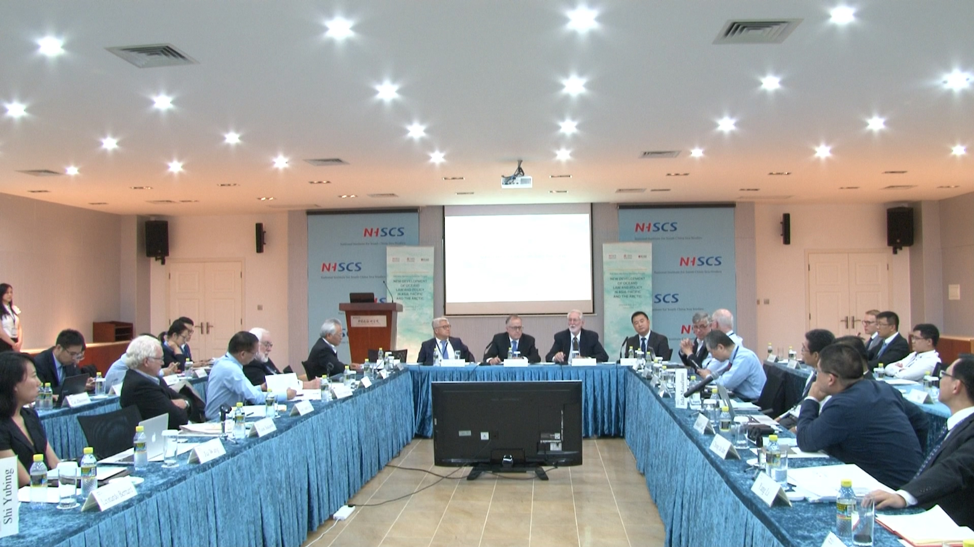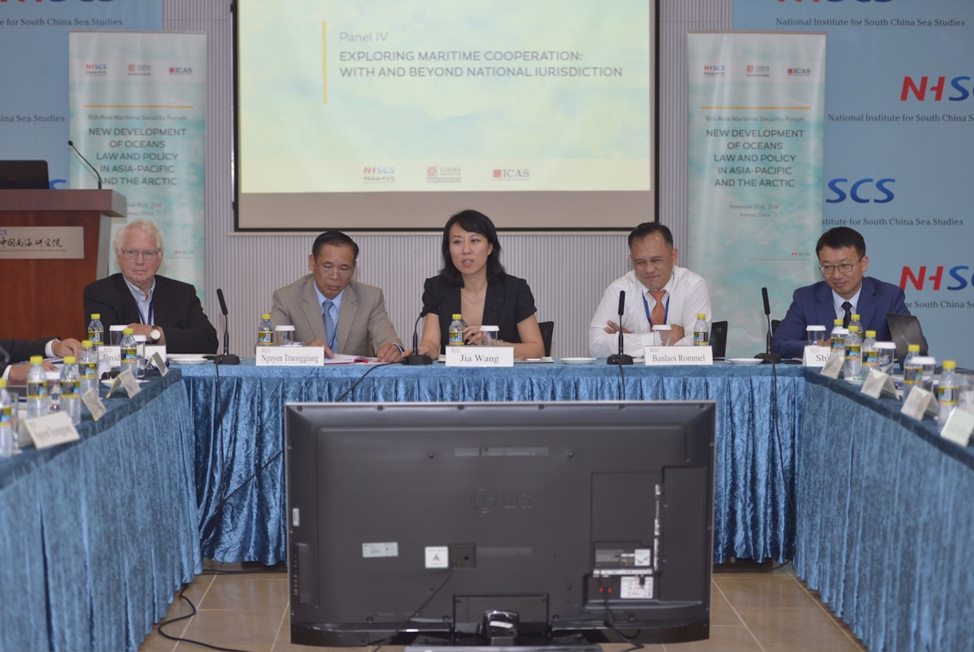Executive Summary of 6th Asia Maritime Security Forum

From November 15-16, 2018, the 6th Asia Maritime Security Forum was held in Haikou, China. Co-organized by China Institute of the University of Alberta (CIUA), and the National Institute for the South China Sea Studies, and the Institute for China-America Studies, the forum brought together more than 40 participants from China, Canada, Australia, South Korea, Japan, Singapore, Vietnam, and the Philippines, who are mainly scholars and experts from renowned maritime research institutes and universities. CIUA Director Gordon Houlden and NISCSS President Wu Shicun gave welcome remarks at the opening ceremony, hosted by NISCSS at their Haikou facilities.
Launched in 2011 by the NISCSS and CIUA, the annual Asia Maritime Security Forum has been held consecutively for six years, serving as an important institutionalized mechanism for exchanging academic and policy perspectives on regional maritime issues. Themed "New Development of Oceans Law and Policy in Asia Pacific and the Arctic", this year's Forum featured topics that included regional maritime security, developments regarding the law of the sea, the intersection of maritime operations and international legal frameworks, and maritime cooperation within and beyond national jurisdiction. The Forum put forward proposals on international cooperation with regard to maritime security and ocean governance in the Asia Pacific and Arctic.

Panel 1 Reviewing Regional Maritime Security: Current Geopolitics and Beyond
The panelists discussed the negotiation of the Code of Conduct in the South China Sea from both a Chinese and ASEAN perspective, as well as China-Russia relations in the Arctic. China expects the CoC to be concluded in three years from now, though regional disputes, a combination of issues of both territorial sovereignty and maritime boundary delimitation, will not be completely resolved in the foreseeable future. Under these circumstances, the effective management of potential crises is vital for the peace and stability of the region, a common goal shared by claimant and non-claimant states in the disputes alike. The panel also discussed the complicated relationship between Japan and China. In Part because of China's status as Japan's largest trading partner, China and Japan share common interests in a denuclearized North Korea, which may require both countries to set aside past disputes in order to address this security crisis. Finally, panelists agreed that the development of the Northern Sea Route potentially reduces the transportation cost for shipping fossil fuels and natural gas. The Northern Sea Route was also discussed as a way to help Russia's flagging economy, and would assist in the cementing of China's presence in the Arctic.

Panel 2 Reviewing the Law of the Sea: Recent Development in Global and Regional context
The panelist discussed recent developments regarding the Law of the Sea. Specifically, each of the panelists spoke to the appropriateness of using the United Nations Convention on the Law of the Sea to establish and decide maritime boundaries, the development of Extended Continental Shelf jurisdictions, the use of different area-based management tools for cooperation between nations, and the establishment of norms for classification of maritime features as they pertain to maritime boundary claims. Examples that panelist used during the discussion were the Okinotorishima maritime feature, the judgment on the maritime boundary of Côte d'Ivoire and the Republic of Ghana, and the South China Sea.

Panel 3 Maritime Operations and the Law
Panelists discussed the challenges, underlying norms, and international laws that shape the discussion of maritime operations. Each speaker took time to discuss how maritime disputes usually involve contextual applications of the bodies of law that govern maritime rights and cooperation. Most speakers either explicitly stated or eluded to the role of the United Nations Convention on the Law of the Sea (UNCLOS) in these disputes, along with other regional agreements such as the Polar Code. These were used to frame the discussion on border delineation and resource exploitation issues. There was also discussion by several of the speakers about the role of non-military maritime force, and differences between them. These differences included whether or not these maritime forces had law enforcement authority, whether they are a civic organization and the level of armament that the forces my possess.

Panel 4 Exploring Maritime Cooperation: With and Beyond National Jurisdiction
Panelists discussed regional cooperation in the Arctic. The first topic discussed was the composition and operation of the Arctic Council, and what role the Counsel will play in the fight against climate change and the regulation of climate-altering emissions. The panel also discussed transnational and shared problems for China and members of ASEAN, including security instability, fishery depletion, marine environment and ecosystems degradation, piracy, terrorism, transboundary crimes, climate change, and natural disasters. Panelists also discussed the pressure some ASEAN countries may wish to put on China to finalize the Code of Conduct, which they hope will bring long-term stability in the region.

Round Table Discussion
Panelists discussed some key issues in the South China Sea and the Arctic area, including shipping lanes, climate change, Canada-US cooperation, and the overlapping claims between Russia and Canada in the Arctic, law enforcement, coast guard to coast guard cooperation, fish management, COC negotiation, and US FONOPS in the South China Sea.
The Canadian experts concluded that the Canadian Arctic will see an immediate increase in shipping, in part because of a lack of transportation infrastructure. . So far, there is very little connectivity in the Arctic. They also raised concern over climate change in the Arctic, and noted the denial and opposition on climate change from the US government and oil companies respectively, as well as issues arising from drilling and shipping activities in the region. Some scholars argued that although there is much practiced cooperation and coordination between the Canadian and the US governments in the Arctic, largely outside of the diplomatic avenue. Regarding Russia's activities in the Arctic, they noted on Russia's dominant presence in the Arctic, and the overlapping claims between Russia and Canada.
The panelists also discussed their concerns about the law enforcement issues in the South China Sea. A Singapore scholar proposed the procedure legal issue, while another panelist pointed out that there is no one standard for the law enforcement. Therefore, participants agreed to that promotion of better the cooperation between coast guards and researchers on the issue of law enforcement is needed. A Philippine scholar mentioned the good working relationship between Chinese and Philippines Coast Guards, while U.S. scholar reminded that the Coast Guards may not become involve in the disputed areas in the South China Sea. In addition, a Chinese scholar suggested that the CUES can be applied to Coast Guards while a Korean scholar disagreed. A Vietnamese scholar recommended that states could combine the political wills and the legal aspects in order to strengthen the cooperation on fishing management. In addition, states should take confidence in building measures in order to transfer the relationship into the working level, and effectively manage misperceptions and miscalculations.
In terms of the COC negotiation, a Chinese scholar stressed that the US's involvement in the COC negotiation will force the ASEAN states to take sides. The Singapore and Philippine scholars also raised concerns over the interference of the extra-states in the COC negotiation. A Japanese scholar said that Japan would respect the COC if it is consistent with the international law.
Regarding the US FONOPS in the South China Sea, a Korean scholar deemed that the U.S. military activities in the South China Sea generated tough responses from China, and thus proposed three main principles: freedom of navigation, peaceful resolution and international law. He was also suspicious of the participation of Royal Canadian Navy (RCN) in the bilateral military exercise held by Japan and the US, while the Canadian panelists replied that Canada has a long-term defense relationship with Japan and that the US and has transited in the South China Sea and the East Sea consistently. It was noted that the RCN would like to cooperate with all navies, including Japan and the US. Moreover, he clarified that the Canadian warships and supply ships had no provocation purpose, and that the RCN would not conduct FON operations in the South China Sea. It's also stated that CUES works well in practice between China and Canada, and suggested China and the US should improve mutual communication, and be more careful regarding encounters between aircraft and warships at sea. The Chinese scholars believed that China and the US could cooperate on the South China Sea because both sides have common interests. Finally, a Canadian scholar concluded the lessons from the South China Sea to the Arctic, mainly including avoiding repeating the mistakes in the South China Sea and enhancing scientific cooperation.